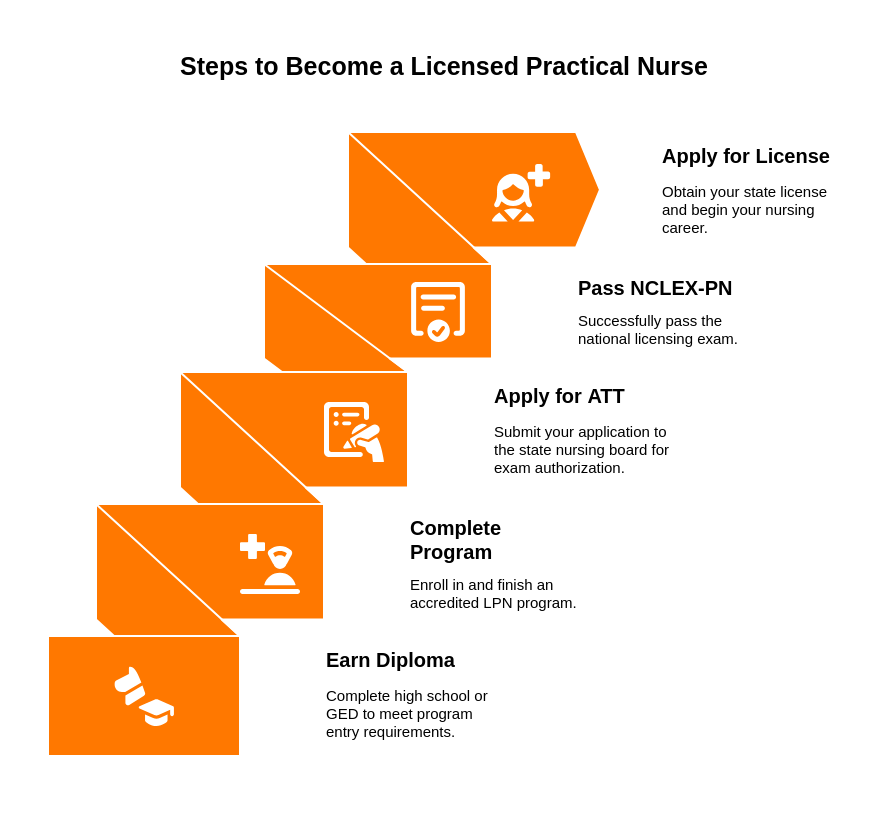Programs Near You
Select a program of interest down below and we'll connect you with schools that match
How to Become a Licensed Practical Nurse (LPN)
Updated October 21, 2025 | Brad Fishbein
If you’re compassionate, detail-oriented, and want to make a real difference every day, becoming a Licensed Practical Nurse (LPN) is one of the fastest and most rewarding ways to enter the nursing field.
LPNs (also called Licensed Vocational Nurses or LVNs in some states) provide essential patient care in hospitals, nursing homes, clinics, and home health settings. You’ll assist registered nurses and doctors, monitor patient health, and help people recover comfortably and safely.
What Licensed Practical Nurses Actually Do
LPNs play a vital hands-on role in patient care — supporting both medical teams and patients throughout treatment.
Common Responsibilities
- Taking vital signs (blood pressure, temperature, pulse, etc.)
- Administering medications and injections
- Assisting with wound care and bandaging
- Helping patients with daily needs (bathing, dressing, feeding)
- Updating charts and reporting changes in patient condition
LPNs are often the first to notice when a patient’s condition changes — making their role critical to quality care.
Salary & Job Outlook
| Quick Facts | Licensed Practical Nurses (LPNs) |
|---|---|
| 2024 Median Pay | $62,340 per year / $29.97 per hour |
| Typical Entry-Level Education | Postsecondary nondegree award |
| Work Experience Required | None |
| Training Time | 12–18 months |
| Job Outlook (2023–33) | 3% (As fast as average) |
| Employment Change (2023–33) | +17,100 jobs |
Source: U.S. Bureau of Labor Statistics – Licensed Practical and Licensed Vocational Nurses
LPNs are in steady demand due to the growing aging population and the nationwide need for affordable, skilled nursing care.
How to Become a Licensed Practical Nurse (5 Steps)
Becoming an LPN doesn’t require a college degree — just accredited training, a license, and a desire to care for others.
-
Earn a High School Diploma or GED
You’ll need a diploma or equivalent to enroll in an LPN training program. Science classes like biology or chemistry are a great foundation. -
Complete an Accredited LPN Program
Programs are offered at trade schools, community colleges, and hospitals. Coursework includes:- Nursing fundamentals
- Anatomy and physiology
- Pharmacology
- Patient care techniques
- Clinical practice in hospitals or long-term care facilities
Most programs take 12 to 18 months to complete.
-
Apply for Authorization to Test (ATT)
After graduation, you must apply through your state nursing board to take the national licensing exam. -
Pass the NCLEX-PN Exam
The National Council Licensure Examination for Practical Nurses (NCLEX-PN) measures your readiness for real-world nursing responsibilities. -
Apply for State Licensure and Start Working
Once you pass, you’ll be eligible for state licensure.
You can work in hospitals, clinics, rehabilitation centers, or home healthcare.

Licensing & Certification
LPNs must be licensed in the state where they practice. Requirements typically include:
- Graduation from an accredited program
- Passing the NCLEX-PN exam
- Submitting fingerprints and background checks
Additional certifications can increase earning potential:
- IV Therapy Certification
- Gerontology or Pediatric Nursing Certification
- Wound Care or Hospice Specialization
Many LPNs later continue their education to become Registered Nurses (RNs) through bridge programs.
Skills That Make You Great at This
- Compassion and patience
- Strong attention to detail
- Communication and teamwork
- Emotional resilience
- Critical thinking under pressure
The best LPNs combine empathy with clinical skill — providing both care and comfort.
Where You’ll Work (and Grow)
LPNs work in:
- Hospitals and clinics
- Nursing homes and assisted living facilities
- Physician offices
- Home healthcare and hospice
- Government and military facilities
Career Growth Paths
- Charge Nurse or Shift Supervisor
- Registered Nurse (via LPN-to-RN program)
- Clinical or Administrative Specialist
- Home Health Care Coordinator
Pros & Cons
Pros:
- Quick path to a healthcare career
- Strong job stability and benefits
- Rewarding, hands-on patient care
- Flexible work environments
Cons:
- Physically and emotionally demanding
- Long shifts or overnight work common
- Must maintain licensure and continuing education
Related Trades
Start Your LPN Nursing Journey
If you’re ready to start a stable and meaningful healthcare career, LPN training is one of the fastest routes to making a difference.
Your path to nursing starts here.
Explore Related Topics:
Notice an update we should make?
We strive for accuracy. Contact us here if you see incorrect or outdated info on this page.

Meet the author: Brad Fishbein is a Florida Licensed Mold Assessor and council-certified Microbial Investigator. He’s the founder of TradeCareerPath.com and has completed over 5,000 mold inspections since 2009. Brad now helps homeowners and tradespeople make smart decisions about mold, licensing, and skilled career paths.
.svg)